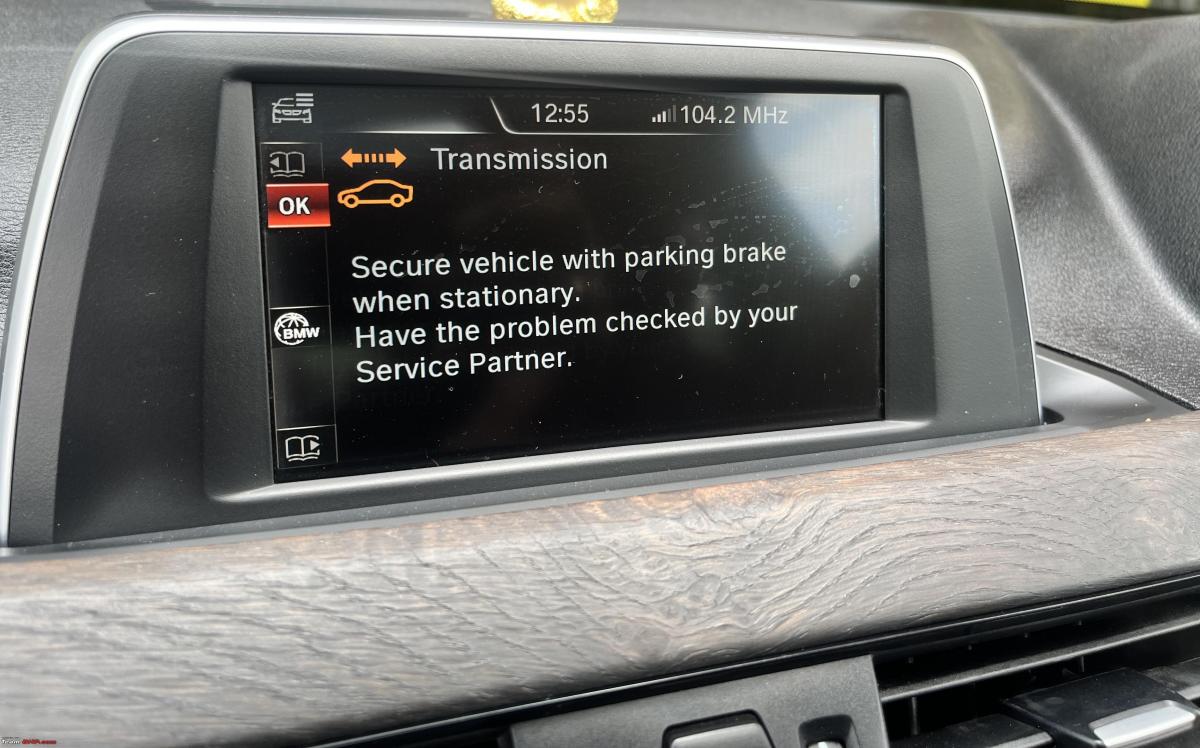Fixing a parking brake malfunction involves cleaning and checking the components, checking the voltage, and examining the cables. It is important to ensure that the electric parking brake components are in good condition for it to function properly.
Driving with a faulty parking brake can cause damage to the vehicle’s transmission. There are various reasons why parking brakes can fail, such as worn brake cables, malfunctioning brake calipers, low brake fluid levels, Parking Brake Malfunction and problems with the brake shoes or pads.
Rust or corrosion can also affect the parking brake system and lead to failure. It is crucial to address parking brake malfunctions promptly to ensure safe and efficient vehicle operation.
2. Common Causes Of Parking Brake Malfunction
Common causes of parking brake malfunction include faulty or dirty switches, damaged motors or cables, debris or rust in the system, and outdated software. It is important to regularly clean and check the components, examine the cables, and ensure proper voltage to prevent malfunctions.
Driving with a faulty parking brake can cause damage to the transmission.
Parking brake malfunction can be caused by various factors, ranging from simple issues to more complex problems. Identifying the underlying cause is crucial for effectively troubleshooting and resolving the problem. Here are the most common causes of parking brake malfunction:
2.1 Dust Or Debris In The Brake System
Excessive dust or debris accumulation in the brake system can hinder the smooth operation of the parking brake. This can lead to a compromised braking ability and an increased risk of accidents. Common areas where dust and debris can accumulate include the brake shoes, brake calipers, and brake cables.
2.2 Faulty Or Damaged Components
The parking brake system is composed of various components such as the brake shoes, brake calipers, cables, and control switch. Any faulty or damaged component can result in a parking brake malfunction. For example, worn-out brake shoes may not make proper contact with the brake drum, causing ineffective braking.
2.3 Outdated Software Or System
In modern vehicles, parking brake systems employ electronic components and software for operation. Outdated software or system can lead to compatibility issues or malfunctions. It is essential to keep the software and system up to date to ensure optimal performance of the parking brake.
By understanding these common causes of parking brake malfunction, you can take appropriate measures to prevent and resolve such issues. Regular maintenance, including cleaning the brake system and inspecting components for damage, can help maintain the efficiency and safety of your parking brake system.

3. Troubleshooting Tips For Quick Fixes
If you’re experiencing a parking brake malfunction, there are a few troubleshooting tips you can try for quick fixes. First, ensure that all components are in good condition and clean. Check the voltage and examine the cables for any damage or debris.
If you’re experiencing a parking brake malfunction, don’t panic. There are several troubleshooting tips you can try before taking your vehicle to a mechanic. These quick fixes can potentially save you time and money. In this section, we will explore 6 troubleshooting tips you can implement to resolve common parking brake issues.
3.1 Cleaning And Checking Components
The first step in troubleshooting a parking brake malfunction is to clean and check the components. Regular maintenance is crucial to ensure the electric parking brake functions properly. Use a soft cloth or a brush to remove dust and debris from the brake components, including the button or switch.
3.2 Checking Voltage Supply
Verify that there is a proper voltage supply to the electric parking brake system. Inspect the battery connections to ensure they are securely tightened. A loose or corroded connection can cause issues with the parking brake. Additionally, check the battery voltage to ensure it is within the recommended range.
3.3 Examining Cables
Inspect the cables connected to the parking brake system. Look for any signs of wear or damage, such as fraying or kinks. Ensure that the cables are properly connected and free from any obstructions or debris that could hinder their functionality. If you notice any issues with the cables, they may need to be replaced.
3.4 Resetting The Electronic Parking Brake
If your vehicle is equipped with an electronic parking brake, you can try resetting it to resolve any malfunctions. Consult your vehicle’s manual to locate the electronic parking brake control button. Press and hold the button for a few seconds until you hear a click or feel a slight movement from the parking brake. This action should reset the electronic parking brake.
3.5 Replacing Faulty Or Broken Components
If you’ve checked the components, cables, and voltage supply, but the parking brake still malfunctions, it may be necessary to replace any faulty or broken parts. Diagnosing and replacing specific components should be handled by a qualified mechanic to ensure proper installation and functionality.
3.6 Dealing With Outdated Software
In some cases, a parking brake malfunction can be attributed to outdated software. If your vehicle’s software is outdated, it may be causing compatibility issues with the parking brake system. Consult your vehicle’s manufacturer for software updates or take your vehicle to a professional who specializes in updating vehicle software.
5. Professional Assistance And Maintenance
When it comes to parking brake malfunctions, it’s important to seek professional assistance and maintenance to ensure the safety and reliability of your vehicle. Professional mechanics have the expertise and knowledge to diagnose and fix any issues with your parking brake system.
5.1 When To Seek Professional Help
If you notice any of the following signs or symptoms, it’s time to seek professional help:
- Weird noises: If you hear strange noises when engaging or disengaging the parking brake, it could indicate a mechanical issue that needs immediate attention.
- Brake warning light: If the brake warning light on your dashboard is illuminated, it could be a sign that there’s a problem with your parking brake system.
- Difficulty releasing the parking brake: If you have trouble releasing the parking brake lever or if it gets stuck, it’s best to have a professional inspect and repair the system.
Remember, attempting to fix parking brake issues yourself without the proper knowledge and tools can lead to further damage or even accidents. It’s always better to leave it to the professionals.
5.2 Regular Maintenance And Inspection
To prevent parking brake malfunctions and ensure optimal performance, regular maintenance and inspection are crucial.
Here are some key maintenance tips:
- Keep it clean: Regularly clean the parking brake components to prevent dirt, debris, and rust buildup that can cause the system to malfunction.
- Check for wear and tear: Inspect the cables, brake pads, and other components for any signs of wear and tear. Replace any damaged or worn-out parts immediately.
- Test the parking brake: Test the parking brake regularly to make sure it engages and disengages smoothly without any issues.
- Get regular professional inspections: It’s recommended to have your parking brake system inspected by a professional at least once a year to catch any potential problems early on.
By following these maintenance practices and getting professional inspections, you can ensure your parking brake remains in top condition and provides the safety and peace of mind you need on the road.


Frequently Asked Questions Of Parking Brake Malfunction
How Do You Fix Park Brake Malfunction?
To fix a park brake malfunction, follow these steps: 1. Clean and check the components, ensuring they are in good condition. 2. Check the voltage to ensure proper functioning. 3. Examine the cables for any damage. 4. Release any debris or rust in the system.
5. Reset the electronic parking brake if necessary. Driving with a faulty e-brake can lead to transmission damage. Take parking brake failure seriously and address it promptly.
Can I Drive My Car With Parking Brake Malfunction?
No, it is not recommended to drive your car with a parking brake malfunction. Driving with a faulty parking brake can cause damage to your transmission.
How Do You Reset Parking Brake Fault?
To reset a parking brake fault, follow these steps: 1. Clean and check all components. 2. Check voltage to ensure proper power supply. 3. Examine cables for any damage. 4. Address any debris or rust in the system. 5. Update software if needed.
Driving with a faulty parking brake can cause damage to your transmission, so it’s important to address the issue promptly.
What Does Parking Brake Failure Mean?
Parking brake failure refers to the malfunction or inability of the parking brake system to engage or hold a vehicle in place. This can be caused by various factors such as worn brake cables, malfunctioning brake calipers, low brake fluid levels, or issues with the brake shoes or pads.
Rust or corrosion can also contribute to parking brake failure. It is important to address this issue promptly to ensure the safety and proper functioning of the vehicle.
Conclusion
If you’re experiencing a parking brake malfunction, it’s crucial to address it promptly to avoid further damage. Start by checking the components and ensuring they’re in good condition. Examine the cables and check for any debris or rust in the system.
In some cases, a faulty switch or outdated software may be the issue. Remember, driving with a broken parking brake can lead to transmission damage, so it’s best to take it seriously and seek a professional’s assistance if needed.


1 thought on “Parking Brake Malfunction: Troubleshooting Tips for Quick Fixes”